0909技巧7语态转换法
语态转换译法
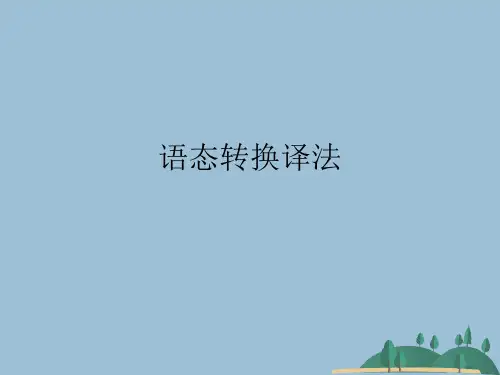
•
(Charlotte Brontë: Jane Eyre)
• 【译文】她以为一切都是公正合法的,做梦也没 想到过自己竟会被诱入欺诈婚姻的圈套,跟一个 骗子、疯子、十足的坏蛋缔结姻缘。
B. 译成 “挨” 字句
• “挨”仅用于翻译该动作是对动作接受者( 受事者)不利或不好的句子。
• 例1:The boy was criticized yesterday. • 【译文】这孩子昨天挨了一顿批评。 • 例2:I was caught in the downpour. • 【译文】我在大雨中挨浇了。 •
• 【译文】这件事必须在适当的时候用适当 的手段予以处理。
课堂互动1: 翻译句子, 顺译成被动句
• 1.Those who perform deeds of merit will be • rewarded. • 2.Translation technique should be paid enough • attention to. • 3.The temperature of the earth is determined by the • amount of solar heat which the atmosphere can • keep. • 4.His father was killed before liberation. • 5.With a true democratic system, he said, Egypt • would not have been defeated by Israel in Nhomakorabea1967.
• 例1:Love can not be forced. • 【译文】爱情不能强求。 • 例2:Love and cough cannot be hidden. • 【译文】爱情和咳嗽都无法隐藏。
句型转换技巧总结
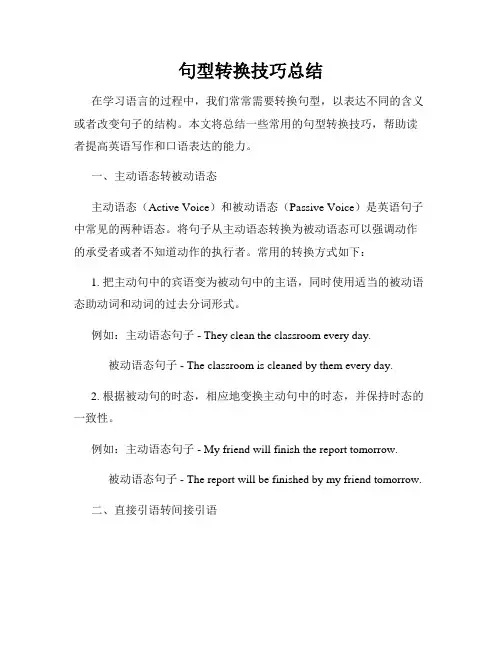
句型转换技巧总结在学习语言的过程中,我们常常需要转换句型,以表达不同的含义或者改变句子的结构。
本文将总结一些常用的句型转换技巧,帮助读者提高英语写作和口语表达的能力。
一、主动语态转被动语态主动语态(Active Voice)和被动语态(Passive Voice)是英语句子中常见的两种语态。
将句子从主动语态转换为被动语态可以强调动作的承受者或者不知道动作的执行者。
常用的转换方式如下:1. 把主动句中的宾语变为被动句中的主语,同时使用适当的被动语态助动词和动词的过去分词形式。
例如:主动语态句子 - They clean the classroom every day.被动语态句子 - The classroom is cleaned by them every day.2. 根据被动句的时态,相应地变换主动句中的时态,并保持时态的一致性。
例如:主动语态句子 - My friend will finish the report tomorrow.被动语态句子 - The report will be finished by my friend tomorrow.二、直接引语转间接引语直接引语(Direct Speech)和间接引语(Indirect Speech)是表示别人的话语时的两种方式。
转换为间接引语可以更加客观准确地表达别人的观点、意见或者陈述。
常用的转换方式如下:1. 使用动词say或者tell引导从句,同时根据引语人称和时态,相应变换引语中的人称和时态。
例如:直接引语 - "I like swimming," she said.间接引语 - She said that she liked swimming.2. 注意一般现在时、一般过去时和将来时等时态的转换,以及第一人称和第三人称等的人称变化。
例如:直接引语 - "I will go to the concert tonight," he said.间接引语 - He said that he would go to the concert that night.三、从复合句转换为简单句复合句(Complex Sentence)由一个主句和一个或多个从句构成,转换为简单句可以使语言更加简洁明了。
语态变换法
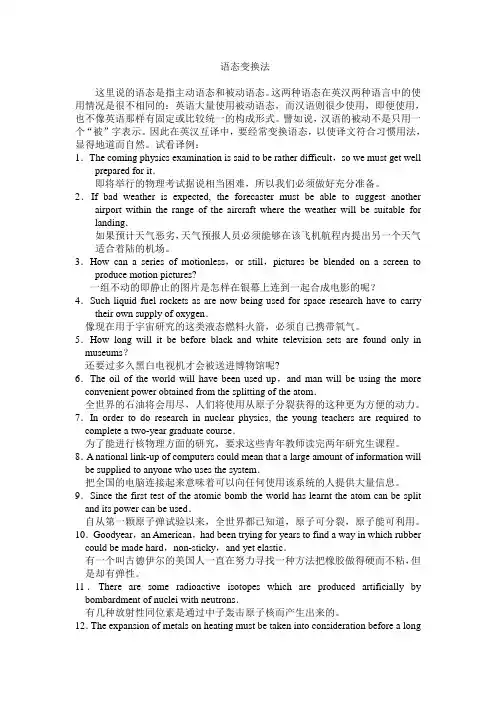
语态变换法这里说的语态是指主动语态和被动语态。
这两种语态在英汉两种语言中的使用情况是很不相同的:英语大量使用被动语态,而汉语则很少使用,即便使用,也不像英语那样有固定或比较统一的构成形式。
譬如说,汉语的被动不是只用一个“被”字表示。
因此在英汉互译中,要经常变换语态,以使译文符合习惯用法,显得地道而自然。
试看译例:1.The coming physics examination is said to be rather difficult,so we must get well prepared for it.即将举行的物理考试据说相当困难,所以我们必须做好充分准备。
2.If bad weather is expected, the forecaster must be able to suggest another airport within the range of the aircraft where the weather will be suitable for landing.如果预计天气恶劣,天气预报人员必须能够在该飞机航程内提出另一个天气适合着陆的机场。
3.How can a series of motionless,or still,pictures be blended on a screen to produce motion pictures?一组不动的即静止的图片是怎样在银幕上连到一起合成电影的呢?4.Such liquid fuel rockets as are now being used for space research have to carry their own supply of oxygen.像现在用于宇宙研究的这类液态燃料火箭,必须自己携带氧气。
5.How long will it be before black and white television sets are found only in museums?还要过多久黑白电视机才会被送进博物馆呢?6.The oil of the world will have been used up,and man will be using the more convenient power obtained from the splitting of the atom.全世界的石油将会用尽,人们将使用从原子分裂获得的这种更为方便的动力。
语法句型转换的基本原则和技巧
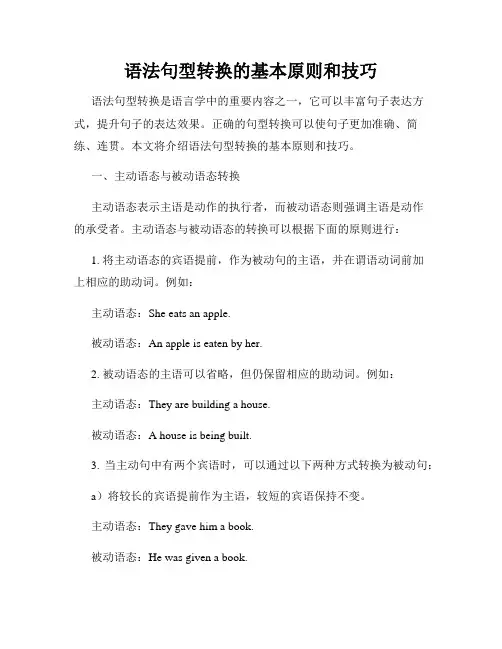
语法句型转换的基本原则和技巧语法句型转换是语言学中的重要内容之一,它可以丰富句子表达方式,提升句子的表达效果。
正确的句型转换可以使句子更加准确、简练、连贯。
本文将介绍语法句型转换的基本原则和技巧。
一、主动语态与被动语态转换主动语态表示主语是动作的执行者,而被动语态则强调主语是动作的承受者。
主动语态与被动语态的转换可以根据下面的原则进行:1. 将主动语态的宾语提前,作为被动句的主语,并在谓语动词前加上相应的助动词。
例如:主动语态:She eats an apple.被动语态:An apple is eaten by her.2. 被动语态的主语可以省略,但仍保留相应的助动词。
例如:主动语态:They are building a house.被动语态:A house is being built.3. 当主动句中有两个宾语时,可以通过以下两种方式转换为被动句:a)将较长的宾语提前作为主语,较短的宾语保持不变。
主动语态:They gave him a book.被动语态:He was given a book.b)在不改变宾语顺序的情况下,将两个宾语中的较长的一个提前作为主语,并在谓语动词后加上介词"to"。
例如:主动语态:They gave a book to him.被动语态:A book was given to him.二、直接引语与间接引语转换直接引语是直接使用别人的原话进行引用,而间接引语则是对别人的原话进行转述。
直接引语与间接引语的转换可以根据以下原则进行:1. 引号去掉,将直接引语中的人称代词、时态等改为适当的形式。
例如:直接引语:He said, "I am going to the cinema."间接引语:He said that he was going to the cinema.2. 根据需要使用适当的引导词或连接词。
例如:直接引语:She said, "I will come tomorrow."间接引语:She said that she would come tomorrow.三、改变句子的时态和语态为了改变句子的时态和语态,我们可以使用以下技巧:1. 将动词的时态、形式和情态动词进行相应的转换。
语态的运用与转换主动语态和被动语态的使用场景
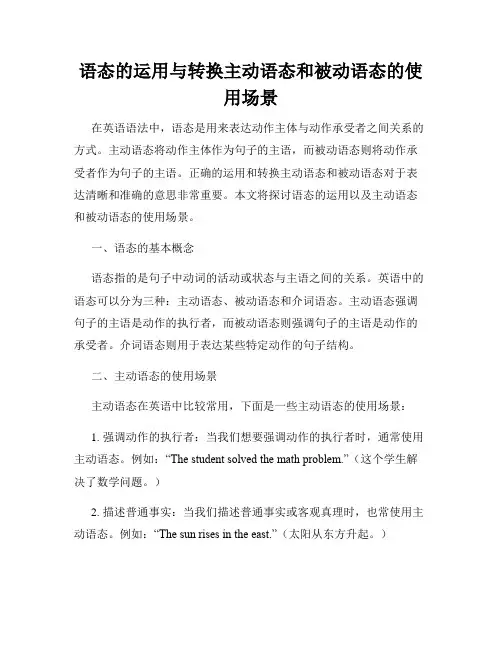
语态的运用与转换主动语态和被动语态的使用场景在英语语法中,语态是用来表达动作主体与动作承受者之间关系的方式。
主动语态将动作主体作为句子的主语,而被动语态则将动作承受者作为句子的主语。
正确的运用和转换主动语态和被动语态对于表达清晰和准确的意思非常重要。
本文将探讨语态的运用以及主动语态和被动语态的使用场景。
一、语态的基本概念语态指的是句子中动词的活动或状态与主语之间的关系。
英语中的语态可以分为三种:主动语态、被动语态和介词语态。
主动语态强调句子的主语是动作的执行者,而被动语态则强调句子的主语是动作的承受者。
介词语态则用于表达某些特定动作的句子结构。
二、主动语态的使用场景主动语态在英语中比较常用,下面是一些主动语态的使用场景:1. 强调动作的执行者:当我们想要强调动作的执行者时,通常使用主动语态。
例如:“The student solved the math problem.”(这个学生解决了数学问题。
)2. 描述普通事实:当我们描述普通事实或客观真理时,也常使用主动语态。
例如:“The sun rises in the east.”(太阳从东方升起。
)3. 描述习惯动作:对于一些习惯性的动作,我们也常使用主动语态。
例如:“He drinks a cup of coffee every morning.”(他每天早上喝一杯咖啡。
)三、被动语态的使用场景被动语态用于强调动作的承受者,以下是一些使用被动语态的场景:1. 不知道或者不关心动作的执行者:当我们不知道或者不关心动作的执行者时,可以使用被动语态。
例如:“The car was stolen.”(这辆车被盗了。
)2. 强调动作的承受者:当我们想要强调动作的承受者时,可以使用被动语态。
例如:“The book was written by a famous author.”(这本书是由一位著名作家所撰写的。
)3. 对比主动语态:有时候我们使用被动语态来对比主动语态,以便更好地突出某些信息。
英语句型转换方法归纳
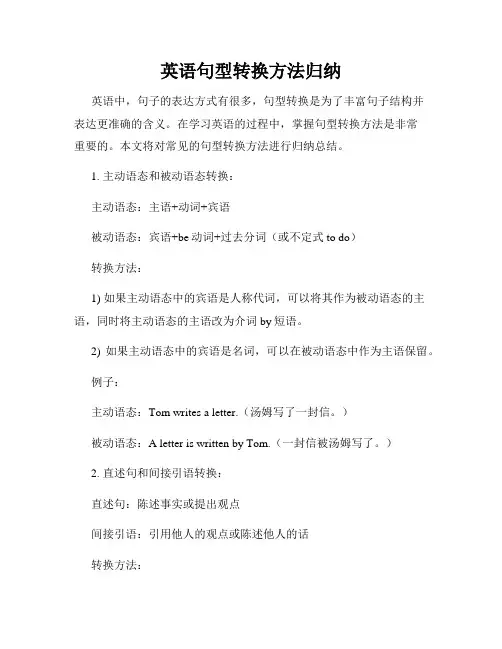
英语句型转换方法归纳英语中,句子的表达方式有很多,句型转换是为了丰富句子结构并表达更准确的含义。
在学习英语的过程中,掌握句型转换方法是非常重要的。
本文将对常见的句型转换方法进行归纳总结。
1. 主动语态和被动语态转换:主动语态:主语+动词+宾语被动语态:宾语+be动词+过去分词(或不定式to do)转换方法:1) 如果主动语态中的宾语是人称代词,可以将其作为被动语态的主语,同时将主动语态的主语改为介词by短语。
2) 如果主动语态中的宾语是名词,可以在被动语态中作为主语保留。
例子:主动语态:Tom writes a letter.(汤姆写了一封信。
)被动语态:A letter is written by Tom.(一封信被汤姆写了。
)2. 直述句和间接引语转换:直述句:陈述事实或提出观点间接引语:引用他人的观点或陈述他人的话转换方法:1) 将引号中的内容改写为间接引语,并在句子中加入适当的引导词,如that, whether等。
2) 如果直述句中有时间状语,需根据具体情况进行相应变换。
例子:直述句:He said, "I am going to the party."(他说:“我要去参加派对。
”)间接引语:He said that he was going to the party.(他说他要去参加派对。
)3. 肯定句和否定句转换:肯定句:主语+动词+其他否定句:主语+do not/does not/did not+动词的原形+其他转换方法:1) 将肯定句中的动词改为否定形式,同时加上适当的助动词。
2) 如果肯定句中已经有助动词,只需将助动词改为否定形式即可。
例子:肯定句:She sings very well.(她唱得很好。
)否定句:She does not sing very well.(她不唱得很好。
)4. 一般现在时和一般过去时转换:一般现在时:主语+动词+其他一般过去时:主语+动词的过去式+其他转换方法:1) 将一般现在时中的动词改为过去式即可。
语态转换的方法与技巧
语态转换的方法与技巧语态是英语语法中的一个重要概念,它指的是动作或状态的表达方式。
通过语态的转换,我们可以在不改变句子意思的前提下,改变句子的结构和语气。
本文将介绍一些常见的语态转换方法和技巧,以帮助读者更好地理解和运用英语语态。
语态转换主要有两个方向:主动语态转被动语态和被动语态转主动语态。
下面将分别介绍这两种转换的方法和技巧。
一、主动语态转被动语态当我们把主动语态转换为被动语态时,需要注意以下几点:1. 确定句子的主语和宾语。
主动语态中,主语是执行动作的主体,而宾语是动作的承受者。
被动语态中,主语变为宾语,而宾语则变为主语。
2. 确定动词的时态和语态。
被动语态的时态和主动语态一致,只是谓语动词要形式上改为被动形式,即由“动词原形+宾语”变为“be+过去分词+by+主语”。
3. 根据语境选择合适的被动词形式。
常见的被动词形式包括一般现在时、一般过去时、现在进行时、过去进行时等。
要根据具体的语境选择适当的时态和语态。
举个例子来说明,假设有一个主动语态的句子:“The cat chased the mous e.”(猫追逐老鼠。
)我们可以使用上述方法将其转换为被动语态:“The mouse was chased by the cat.”(老鼠被猫追逐。
)二、被动语态转主动语态当我们把被动语态转换为主动语态时,需要注意以下几点:1. 确定句子的主语和宾语。
被动语态中,主语是动作的承受者,宾语是动作的执行者。
转换为主动语态后,主语变为原来的宾语,宾语变为新的主语。
2. 确定动词的时态和语态。
被动语态的时态和主动语态一致,只是谓语动词要形式上改为主动形式,即由“be+过去分词+by+主语”变为“动词原形+宾语”。
3. 使用合适的主动词形式。
根据语境,选择恰当的主动词形式,包括一般现在时、一般过去时、现在进行时、过去进行时等。
以一个例句来说明转换的过程:“The car was repaired by the mechanic.”(这辆车被修理师傅修好了。
09语态转换法
第 第七 七讲 语 语态 态变 变换换法 语 语态 态转 转换 换的 的常 常见 见方方法 一 一、 、英 英语 语被 被动 动句 句译 译成 成汉 汉语 语主 主动 动句 句 ( (最 最常 常见 见的 的方 方法法) ( (一 一) )原 原文 文主 主语 语在 在译 译文 文中 中仍 仍作 作主 主语 语 ( (直 直接 接改 改译 译)) 1 1. T T h h e s s t t r r e e e e t w w a a s c c o o n n g g e e s s t t e e dd . 2 2. T T h he h h o o r r s s e w w a a s b b a a d d l l y b b l l o o w w nn . 3 3. T T h h a a t m m a a n c c a a n n n n o o t b b e r r e e l l i i e e d u u p p o o nn . 4 4. T T h h e o o i i l o o f t t h h e w w o o r r l l d w w i i l l l h h a a v v e b b e e e e n u u s s e e d u u p p , a a n n d m m a a n w w i i l l l b b e u u s s i i n n g t t h h e m m o o r r e c c o o n n v v e e n n i i e e nn t p p o o w w e e r o o b b t t a a i i n n e e d f f r r o o m t t h h e s s p p l l i i t t t t i i n n g o o f t t h h e a a t t o o mm . 5 5. T T h h e d d i i s s c c o o v v e e r r y i i s h h i i g g h h l l y a a p p p p r r e e c c i i a a t t e e d i i n t t h h e c c i i r r c c l l e o o f s s c c i i e e n n c c ee . 6 6. T T h h e h h u u l l l o of a s s h h i i p i i s o o f f t t e e n p p r r o o t t e e c c t t e e d a ag g a a i i n n s s t c c o o r r r r o o s s i i o o n w w i i t th a c c o o a a t o o f s s p p e e c ci i a a l p p a a i i n n tt . ( (二 二) )原 原文 文主 主语 语在 在译 译文 文中 中作 作宾 宾语语 1. If bad weather is expected , the forecaster must be able to suggest another airport within therange of the aircraft where the weather will be suitable for landing.2. A national linkup of computers could mean that a large amount of information will besupplied to anyone who uses the system.3. The numerical data concerned are provided in the third chapter.4. The rocket was invented by Chinese in the 12th century.5. 220V was read from the voltmeter.6. He was seen to push a bike out of the house.(三)译 译成 成无 无主 主句 句( (z z e e r r o o s s u u b b j j e e c c t t )) 1 1. C C h h i i l l d d r r e e n s s h h o o u u l l d b b e t t a a u u g g h h t t t o s s p p e e a a k t t h h e t t r r u u t t hh . 2 2. A A n a a g g r r e e e e m m e e n n t w w a a s a a r r r r i i v v e e d a a t a a f f t t e e r t t w w o d d a a y y s s ’ n n e e g g o o t t i i a a t t i i o o nn . ( (四 四) )英 英语 语常 常用 用句 句型 型的 的汉 汉语 语习 习惯 惯译 译法法 1 1. I I t s s h h o o u u l l d b b e n n o o t t e e d t t h h a a t i i n n c c r r e e a a s s i i n n g t t h h e l l e e n n g g t t h o o f t t h h e w w i i r r e w w i i l l l i i n n c c r r e e a a s s e i i t t s r r e e s s i i s s t t a a n n c c ee . 2 2. I I t i i s s s t t a a t t e e d t t h h a a t t t h h e e r r m m o o c c r r e e t t e h h a a s v v i i r r t t u u a a l l l l y t t h h e s s a a m m e s s t t r r e e n n g g t t h a a s n n o o r r m m a a l c c o o n n c c r r e e t t ee . 二 二、 、英 英语 语被 被动 动句 句译 译成 成汉 汉语 语被 被动 动句句 1 1. H H o o w l l o o n n g w w i i l l l i i t b b e b b e e f f o o r r e b b l l a a c c k a a n n d w w h h i i t t e t t e e l l e e v v i i s s i i o o n s s e e t t s a a r r e f f o o u u n n d o o n n l l y i i n m m u u s s e e u u m m ss ? 2 2. I I f y y o o u s s u u b b j j e e c c t t t h h i i s p p r r e e c c i i o o u u s i i n n s s t t r r u u m m e e n n t t t o a h h i i g g h t t e e m m p p e e r r a a t t u u r r e e , i i t w w i i l l l b b e s s e e r r i i o o u u s s l l y d d a a m m a a g g e e dd . 3 3. T T h he e e a a r r t t h i i s h h i i tf f r r o o m t t i i m m e t t o t t i i m m e b b y s s t t r r e e a a m m s o o f e e l l e e c c t t r r i i c c a a l l l l y c c h h a a r rg g e e d p p a a r r t t i i c c l l e e s p p o o u u r r e e d o o u u t bb y t t h h e s s u u nn . 4 4. R R a a d d i i o o s o o f t t h h e o o l l d t t y y p p e a a r r e b b e e i i n n g r r e e p p l l a a c c e e d b b y n n e e w o o n n e e ss . 三 三、 、译 译成 成汉 汉语 语使 使动 动结 结构 构( (C C a a u u s s a a t t i i v v e s s t t r r u u c c t t u u r r e e u u s s i i n n g w w o o r r d d s l l i i k k e 使 使, ,让 让, ,加 加以 以o o r 把 把)) 1 1. P P r r i i n n c c i i p p l l e e s m m e e a a n v v e e r r y l l i i t t t t l l e u u n n l l e e s s s t t h h e e y a a r r e a a c c t t e e d u u p p o o nn . 2 2. R R a a d d i i c c a a l e e n n v v i i r r o o n n m m e e n n t t a a l l i i s s t t s a a r r e a a l l r r e e a a d d y d d e e m m a a n n d d i i n n g t t h h a a t l l e e g g a a l a a n n d e e t t h h i i c c a a l p p r r o o t t e e c c t t i i o o n bb e e e x x t t e e n n d d e e d t t o a a l l l n n a a t t u u r r ee . 3 3. T T h h e t t i i m m e w w i i l l l c c o o m m e w w h h e e n h h o o m m e e s w w i i l l l b b e h h e e a a t t e e df f r r o o m a s s m m a a l l l r r e e a a c c t t o o r i i n t t h h e b b a a s s e e m m e e n n tt . 四 四、 、译 译成 成汉 汉语 语的 的判 判断 断句 句( (… …… …的 的是 是… …… …或 或… …… …是 是… …… …的 的句 句式 式)) 1. Connected with it is a control rod.2. But real influence is not built up by striking attitudes or throwing insults.3. Early cars were very strange of which the tyres on the wheels were made of iron or solidrubber.I I n t t h h e o o t t h h e e r w w a a y r r o o u u n n d s s u u c c h p p a a t t t t e e r r n n s i i n C C h h i i n n e e s s e c c a a n b b e t t r r a a n n s s l l a a t t e e d i i n n t t o E E n n g g l l i i s s h p p a a s s s s i i v v e e .. 1. 故事讲 得娓娓动听。
语态转换法
15
练习:顺译成主动句 1:This problem will be discussed tomorrow. 【译文】这个问题将于明天讨论。 2:The typewriter has not been used for twenty years. 【译文】这台打字机已有20年没用了。 3:The work must be finished before Christmas. 【译文】这项工作必须在圣诞节前完成。 4:Our univrity was built in 1952. 【译文】我校建于1952年。
It is asked that … It is asserted that … It is felt that …
……;
有人会问…… 有人主张…… 有人感到……;人们认为 有人建议……
It is preferred that…
……
It is recommended that … 有人建议……;有人推荐 It is suggested that … It is stressed that … 有人建议…… 有人强调说……
25
It will be said that … It is believed that … It is estimated that … It is announced that …
……
有人会说…… 有人相信…… 有人估计…… 有人通知……; 有人宣称
It is pointed out that … 有人指出…… It is claimed that … 有人宣称…… It is declared that … 有人提出…… It is described that … 有人介绍说…… It has been objected that …有人反驳说…… It is thought that … 人们认为……;有人认
中学写作中的句式转换技巧和变化方式
中学写作中的句式转换技巧和变化方式写作是中学阶段必不可少的一项技能,而句式的转换是一种提升写作水平的重要技巧之一。
通过巧妙地改变句子结构和表达方式,可以使文章更加丰富多样,增强表达的效果。
本文将介绍几种常见的句式转换技巧和变化方式,帮助中学生们提升写作能力。
一、主动语态与被动语态的转换在写作中,我们常常使用主动语态表达事物的主观行为,但有时为了突出对象对主体的作用,可以将主动语态转换为被动语态。
被动语态的变化方式包括:主语变成动作的承受者,动词由主动变为被动,by短语的添加等。
例如,原句“Tom wrote a letter to his teacher.”可以转换为被动语态:“A letter was written to Tom's teacher by Tom.”二、简单句与复合句的转换在写作中,通过将简单句改为复合句,不仅可以使句子结构更加复杂,也可以使文章内容更加丰富。
复合句的变化方式包括:通过连接词如because, although等引导从句,使用关系代词such as, which等连接主句和从句,改变句子结构等。
例如,原句“I am tired. I decide to take a break.”可以转换为复合句:“Because I am tired, I decide to take a break.”三、直接引语与间接引语的转换在写作中,为了避免过于直接地引用他人观点,可以使用间接引语将其转述出来。
间接引语的变化方式包括:改变人称、时态、引导动词等。
例如,原句“Mary said, 'I love reading.'”可以转换为间接引语:“Mary said that she loved reading.”四、形容词与副词的转换在写作中,通过改变形容词为副词,可以更加准确地描述动作或状态。
形容词转换为副词的方式包括:在形容词后面加上-ly,去掉形容词后面的词尾等。
- 1、下载文档前请自行甄别文档内容的完整性,平台不提供额外的编辑、内容补充、找答案等附加服务。
- 2、"仅部分预览"的文档,不可在线预览部分如存在完整性等问题,可反馈申请退款(可完整预览的文档不适用该条件!)。
- 3、如文档侵犯您的权益,请联系客服反馈,我们会尽快为您处理(人工客服工作时间:9:00-18:30)。
第七讲语态变换法语态转换的常见方法一、英语被动句译成汉语主动句(最常见的方法)(一)原文主语在译文中仍作主语(直接改译)1.T h e s t r e e t w a s c o n g e s t e d.街上很挤。
2.T h a t m a n c a n n o t b e r e l i e d u p o n.那人不可信。
3.T h e o i l o f t h e w o r l d w i l l h a v e b e e n u s e d u p,a n d m a n w i l l b e u s i n g t h e m o r e c o n v e n i e n tp o w e r o b t a i n e d f r o m t h e s p l i t t i n g o f t h e a t o m.全世界的石油将会用尽,人们将使用从原子分裂获得的这种更为方便的动力。
4.T h e d i s c o v e r y i s h i g h l y a p p r e c i a t e d i n t h e c i r c l e o f s c i e n c e.这一发现在科学界得到了很高的评价。
(二)原文主语在译文中作宾语1.If bad weather is expected , the forecaster must be able to suggest another airport within therange of the aircraft where the weather will be suitable for landing.如果预计天气恶劣,天气预报人员必须能够在该飞机航程内提出另一个天气适合着陆的机场。
2. A national link-up of computers could mean that a large amount of information will besupplied to anyone who uses the system.把全国的电脑连接起来意味着可以向任何使用该系统的人提供大量信息。
3.The rocket was invented by Chinese in the 12th century.中国人于12世纪发明了火箭。
4.220V was read from the voltmeter.电压表的读数是220V。
5.He was seen to push a bike out of the house.有人看见他推了一辆自行车从那幢房子里走出来。
P92(6) The newly-found electrical material is widely used home and abroad .国内外广泛采用这种新型电工材料。
(三)译成无主句(z e r o-s u b j e c t)1.C h i l d r e n s h o u l d b e t a u g h t t o s p e a k t h e t r u t h.应该教孩子们讲真话。
2.A n a g r e e m e n t w a s a r r i v e d a t a f t e r t w o d a y s’n e g o t i a t i o n.经过三天谈判之后达成了一项协议。
二、英语被动句译成汉语被动句1.H o w l o n g w i l l i t b e b e f o r e b l a c k a n d w h i t e t e l e v i s i o n s e t s a r e f o u n d o n l y i n m u s e u m s?还要过多久黑白电视才会被送进博物馆呢?2.I f y o u s u b j e c t t h i s p r e c i o u s i n s t r u m e n t t o a h i g h t e m p e r a t u r e,i t w i l l b e s e r i o u s l y d a m a g e d.如果你把这台精密仪器置于高温之下,仪器将会受到严重损坏。
3.T h e e a r t h i s h i t f r o m t i m e t o t i m e b y s t r e a m s o f e l e c t r i c a l l y c h a r g e d p a r t i c l e s p o u r e d o u t b yt h e s u n.地球不时为太阳发出的带电粒子流所袭击。
4. The optimists believe defeat is not their fault: circumstances, bad luck, or other people brought it about. Such people are not bothered by defeat.乐观主义者相信失败并不是他们的过错,环境、运气不佳或其他人都可能造成自己的失败。
这些人从不为失败所困扰。
三、译成汉语使动结构(C a u s a t i v e s t r u c t u r e---u s i n g w o r d s l i k e使,让,加以o r把)1.P r i n c i p l e s m e a n v e r y l i t t l e u n l e s s t h e y a r e a c t e d u p o n.如果不加以实践,原则也就没有什么意思了。
2.R a d i c a l e n v i r o n m e n t a l i s t s a r e a l r e a d y d e m a n d i n g t h a t l e g a l a n d e t h i c a l p r o t e c t i o n b ee x t e n d e d t o a l l n a t u r e.激进的环境保护主义者已经要求把法律方面和道德方面的保护扩大到整个自然界。
3.T h e t i m e w i l l c o m e w h e n h o m e s w i l l b e h e a t e d f r o m a s m a l l r e a c t o r i n t h e b a s e m e n t.有朝一日家庭将由安装在地下室里的小反应堆供热。
四、译成汉语的判断句(……的是……或……是……的句式)1.Connected with it is a control rod.与之相连的是一个操纵杆。
2.But real influence is not built up by striking attitudes or throwing insults.要想真正影响别人,摆出盛气凌人的态度或谩骂是无济于事的。
3.Early cars were very strange of which the tyres on the wheels were made of iron or solidrubber.早期的汽车很奇特,它的轮胎是用铁或实心橡胶制成的。
五、英语常用句型的汉语习惯译法1. It should be noted that increasing the length of the wire will increase its resistance.应当注意,增加导线长度会增加其电阻。
2. It is stated that thermocrete has virtually the same strength as normal concrete.据说,保温混凝土的强度与普通混凝土相当。
六、某些表示被动含义的句型的翻译1. This problem deserves discussing. 这个问题值得讨论。
2. The paper can stand criticizing. 这篇论文经得起推敲。
3. The noodles are still cooking. 面条还在煮着。
II、汉译英中的被动语态的翻译1)带有如“被、受、遭、给、挨”等被动标记词的汉语句子应该译成英语被动句例1. 我们挨了半天挤,什么热闹也没看到。
We were pushed and elbowed in the crowd and did not even have a glimpse of the fun.例2. 这个问题必须在适当的时候予以处理。
The problem must be dealt with at an appropriate time2) 含有被动意义的汉语句子应当译成英语的被动句例1. 故事讲得娓娓动听。
The story was told in a pleasant and interesting way.例2.基本建设速度加快,投资环境不断完善。
The capital construction has been accelerated and the environment for investment has been continuously improved.3) 无主句例1. 说话时,已摆了茶点上来。
Meanwhile refreshments had been served.例2. 到目前为止还未得出结论。
So far, no conclusion has been reached.例3. 必须把教育改革进行到底。
The educational reform must be carried through to the end.4) 泛指主语句例1. 人们推测他们总有一天会结婚的。
It is assumed that they will get married one day.例2. 大家认为,他对做这项工作很满足。
He was considered quite satisfied with the job.A s s i g n m e n t知识复习P929) 他们去年遭灾了。
They were hit by a natural calamity last year.10) 决不能把个人利益置于国家利益之上。
Personal interest must not be placed over national interest.11) 抓住了这个主要矛盾,一切问题就迎刃而解了。
Once this principal contradiction is grasped, all problems can be readily solved.。
